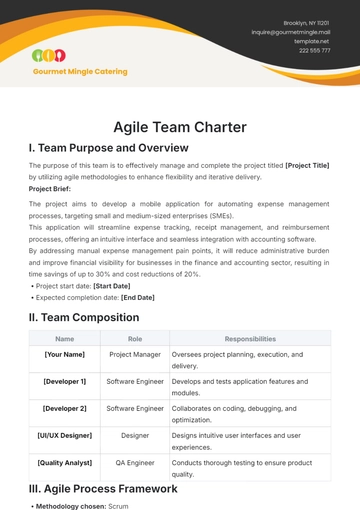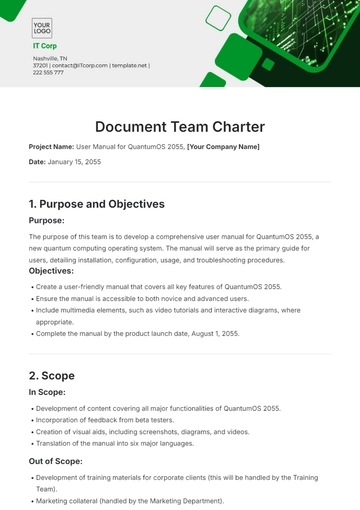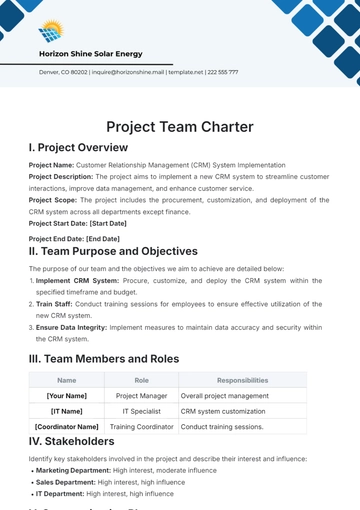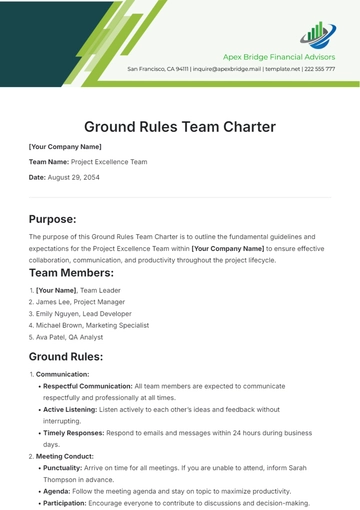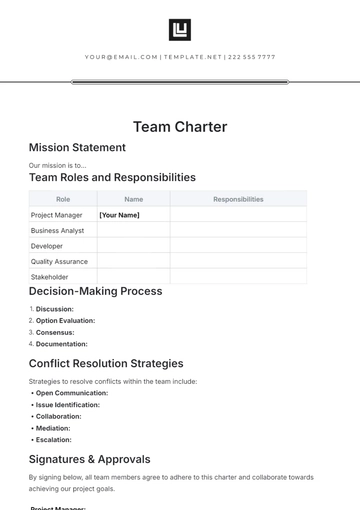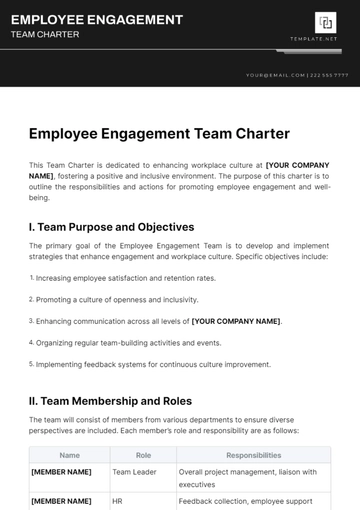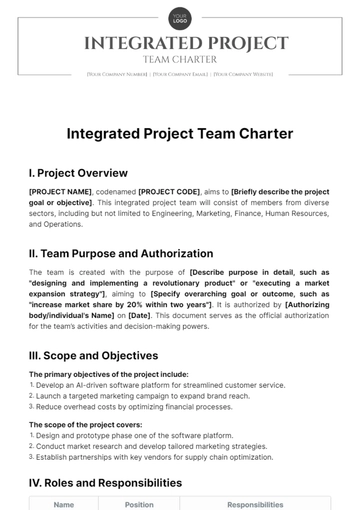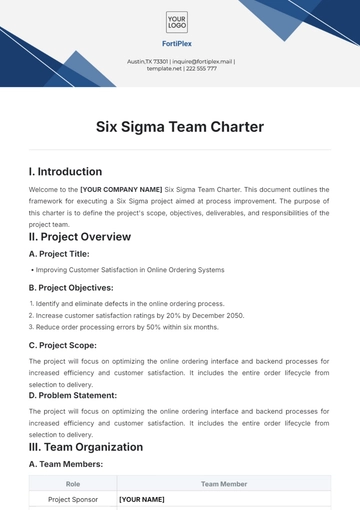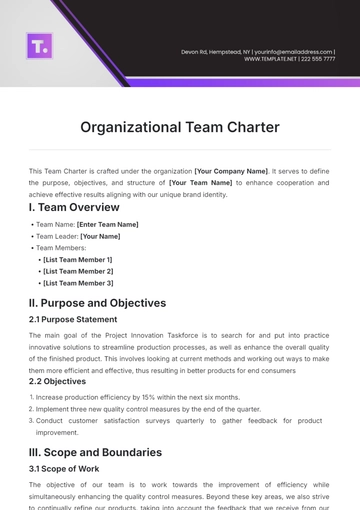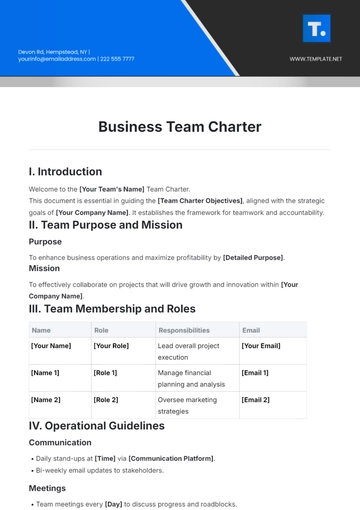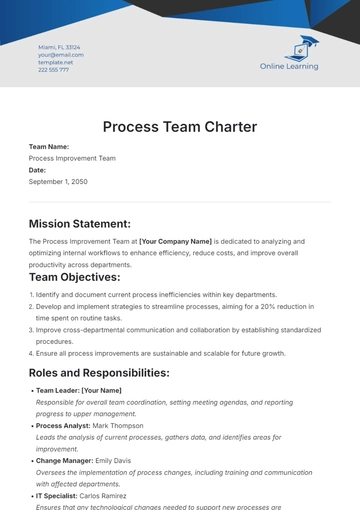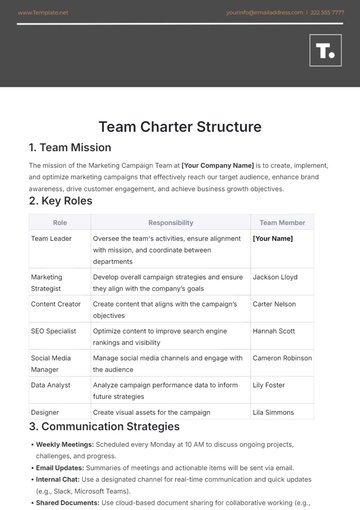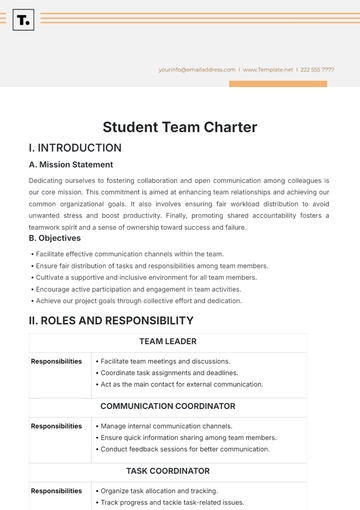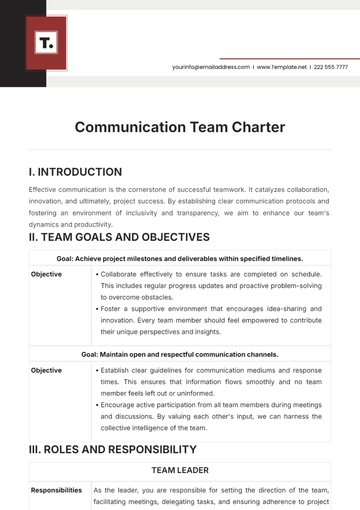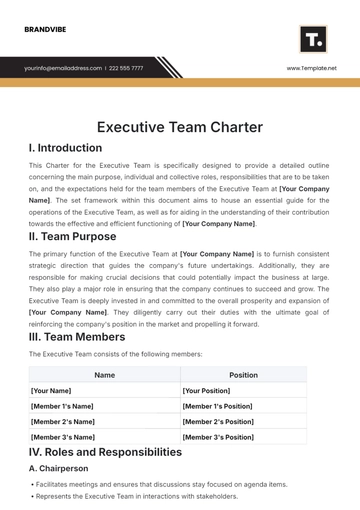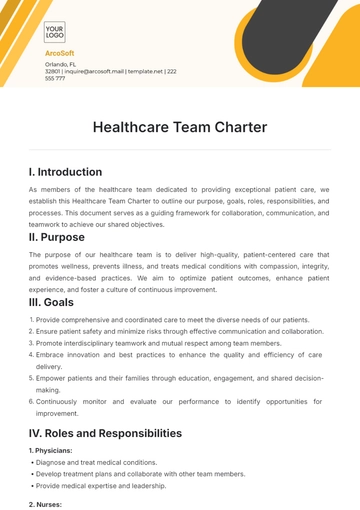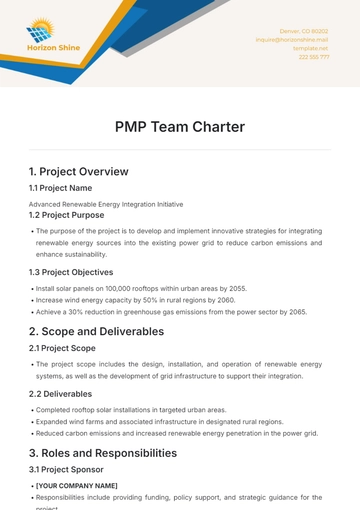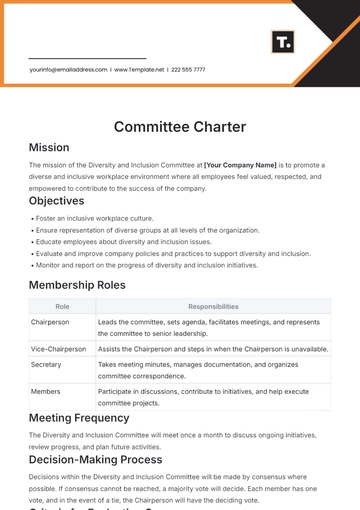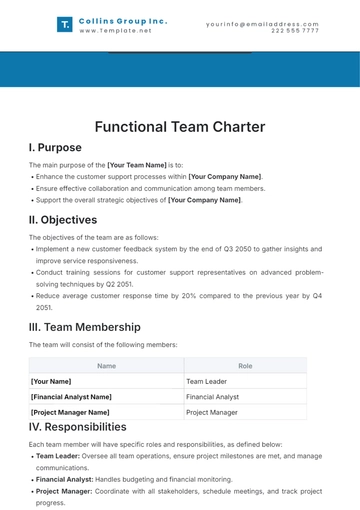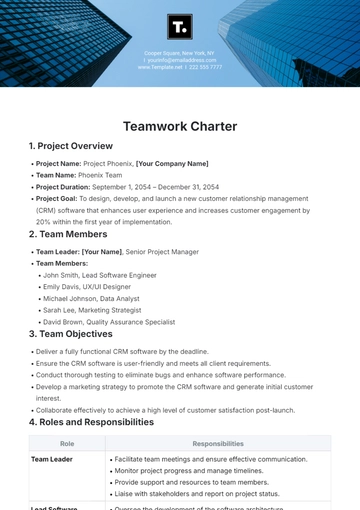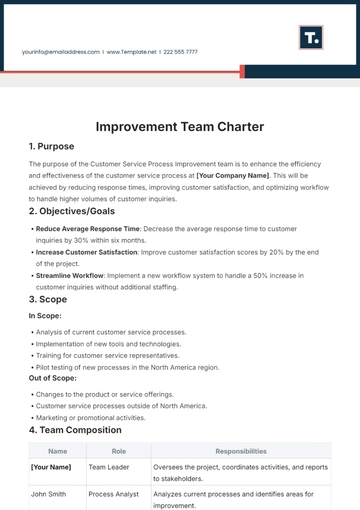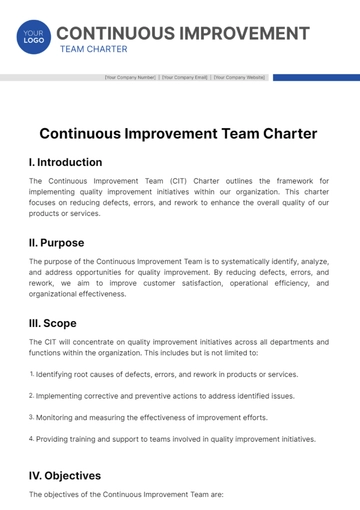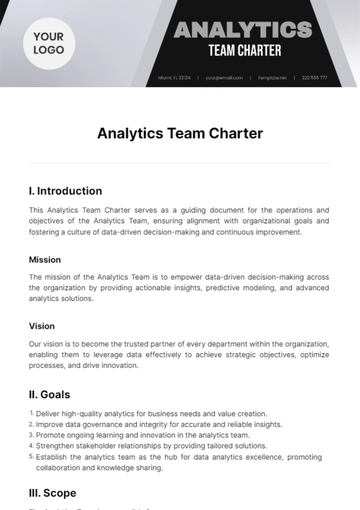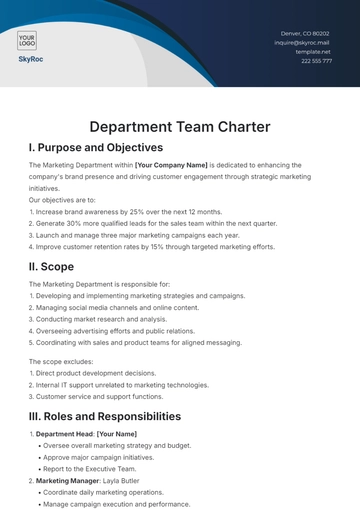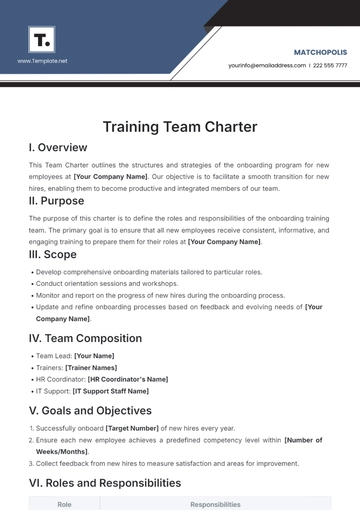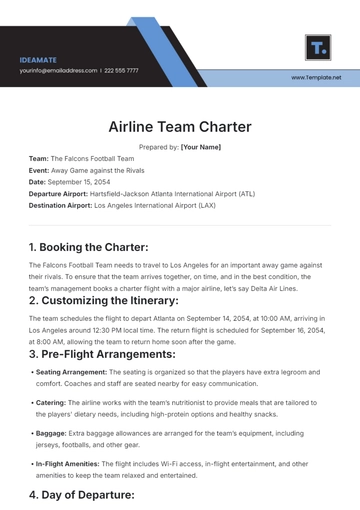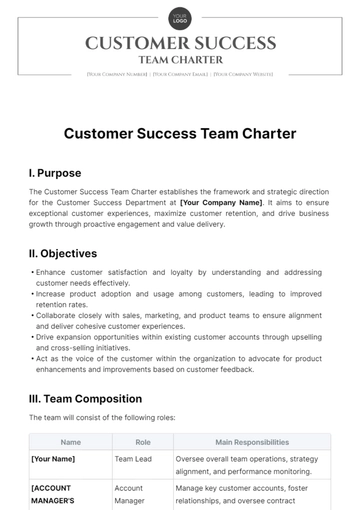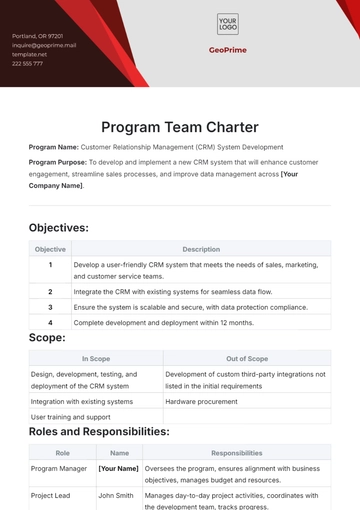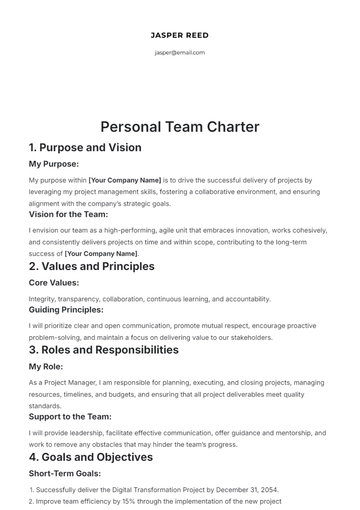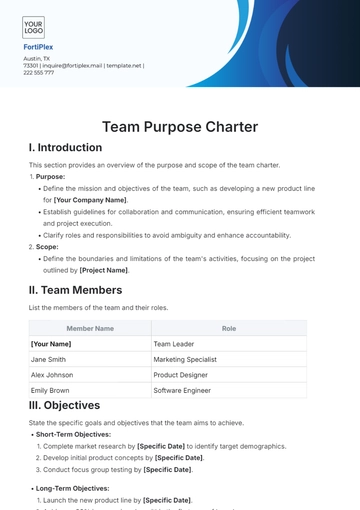Free Team Meeting Charter
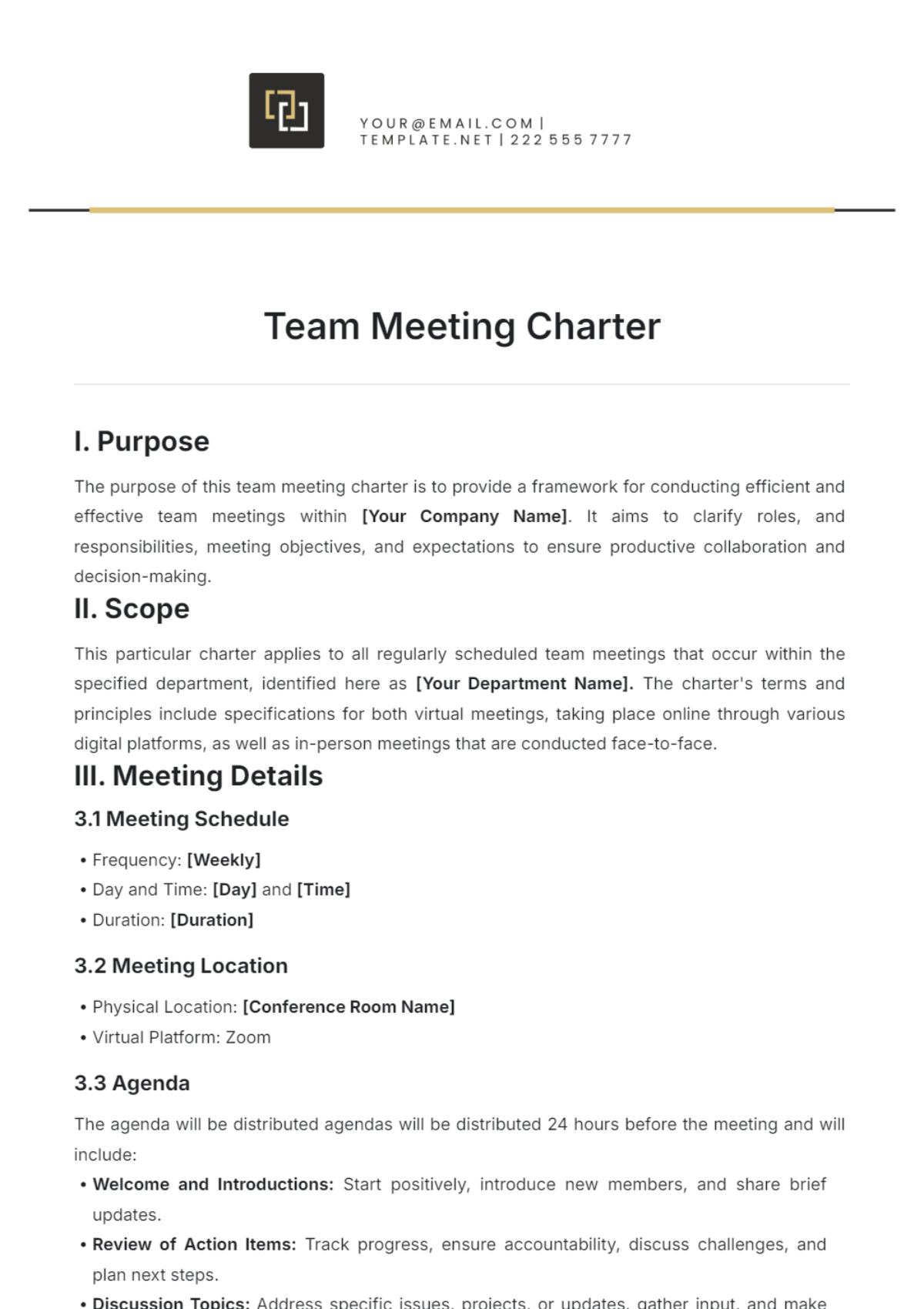
I. Purpose
The purpose of this team meeting charter is to provide a framework for conducting efficient and effective team meetings within [Your Company Name]. It aims to clarify roles, and responsibilities, meeting objectives, and expectations to ensure productive collaboration and decision-making.
II. Scope
This particular charter applies to all regularly scheduled team meetings that occur within the specified department, identified here as [Your Department Name]. The charter's terms and principles include specifications for both virtual meetings, taking place online through various digital platforms, as well as in-person meetings that are conducted face-to-face.
III. Meeting Details
3.1 Meeting Schedule
Frequency: [Weekly]
Day and Time: [Day] and [Time]
Duration: [Duration]
3.2 Meeting Location
Physical Location: [Conference Room Name]
Virtual Platform: Zoom
3.3 Agenda
The agenda will be distributed agendas will be distributed 24 hours before the meeting and will include:
Welcome and Introductions: Start positively, introduce new members, and share brief updates.
Review of Action Items: Track progress, ensure accountability, discuss challenges, and plan next steps.
Discussion Topics: Address specific issues, projects, or updates, gather input, and make decisions.
New Business: Discuss new issues, updates, or initiatives impacting the team.
Q&A: Clarify topics, address questions, and facilitate additional discussion.
Next Steps and Assignments: Set action items, assign responsibilities, and establish deadlines for follow-up tasks.
IV. Roles and Responsibilities
4.1 Meeting Leader
Name: [Your Name]
Responsibilities:
Facilitate the meeting: Lead the meeting by guiding discussions, managing time effectively, and ensuring all agenda items are addressed.
Keep discussions on track: Maintain focus during discussions, steer conversations towards meeting objectives, and prevent off-topic tangents.
Ensure agenda items are covered: Ensure that all planned agenda items are discussed within the allotted time, prioritizing key topics as needed.
Encourage participation: Foster a collaborative environment where all team members feel comfortable sharing ideas, opinions, and insights during the meeting.
4.2 Note-Taker
Name: [Name of Assigned Team Member]
Responsibilities:
Record meeting minutes: Take detailed notes during the meeting, capturing key discussions, decisions made, and action items assigned.
Document action items and decisions: Ensure that all action items and decisions are documented with assigned responsibilities and deadlines for follow-up.
Distribute meeting minutes promptly: Share meeting minutes with team members promptly, typically within a specified timeframe after the meeting, to keep everyone informed and accountable.
4.3 Timekeeper
Name: [Name of Assigned Team Member]
Responsibilities:
Monitor meeting time: Keep track of the time during the meeting to ensure discussions stay on schedule and that there is enough time allocated for each agenda item.
Notify when time is running short: Alert the meeting leader and participants when the time for a particular agenda item is limited or when the meeting overall is running short on time.
Help prioritize agenda items: Assist the meeting leader in prioritizing agenda items based on importance and time constraints, ensuring that critical topics are addressed first and non-urgent items are managed efficiently.
4.4 Participants
It is expected that all members of the team will:
Attend meetings punctually: Arrive on time for scheduled meetings to ensure prompt start and maximum participation, respecting others' time and commitments.
Participate actively in discussions: Engage in discussions by sharing insights, asking questions, offering opinions, and contributing to brainstorming sessions, fostering collaborative problem-solving.
Contribute ideas and suggestions: Offer innovative ideas, suggestions, or solutions related to meeting topics or projects, contributing to team creativity and decision-making processes.
Review meeting minutes and action items: Regularly review meeting minutes to stay informed about discussions, decisions, and assigned action items, ensuring accountability and follow-through on tasks.
V. Communication
Use respectful and professional language: Proper communication requires consistent courtesy, professionalism, and positivity. Polite and respectful expressions mirror our professional approach and facilitate successful discussions.
Don't interrupt others; use the "raise hand" feature in virtual meetings. Respect others' speaking time by avoiding interruptions. In virtual meetings, utilize features like "raise hand" to indicate a desire to speak.
Encourage open dialogue and diverse perspectives: Foster an environment where team members feel comfortable expressing their ideas, opinions, and perspectives openly. Encourage inclusivity and value diverse viewpoints.
VI. Decision-Making
Aim for consensus whenever possible: Strive to reach agreement or consensus among team members when making decisions, considering different viewpoints, and finding common ground.
Document decisions and action items: Ensure that decisions made during meetings are documented clearly, along with corresponding action items, responsibilities, and deadlines.
Escalate unresolved issues as per [Your Company Name]'s escalation process: Description: If certain issues or decisions cannot be resolved within the team, follow the established escalation process within the organization to seek guidance or resolution from higher authorities.
VII. Conflict Resolution
Address conflicts constructively and respectfully: Approach conflicts with a positive mindset, focusing on finding solutions rather than blaming individuals. Use respectful communication and seek common ground.
Seek mediation from team leaders if needed: If conflicts persist or escalate, involve team leaders or designated mediators to facilitate discussions and help reach mutually acceptable resolutions.
Focus on solutions and mutual understanding: Emphasize finding solutions that benefit the team as a whole, fostering mutual understanding and collaboration among team members involved in resolving conflicts.
VIII. Review and Updates
Every quarter, we will assess the effectiveness and make necessary updates to our charter that greatly impact our work. We regard team feedback as essential in refining our meeting procedures and results, thereby creating a more efficient working space.
- 100% Customizable, free editor
- Access 1 Million+ Templates, photo’s & graphics
- Download or share as a template
- Click and replace photos, graphics, text, backgrounds
- Resize, crop, AI write & more
- Access advanced editor
Efficiently organize team meetings with our Team Meeting Charter Template on Template.net. This editable and customizable document is tailored for collaborative planning, ensuring clear objectives and smooth discussions. Customize it effortlessly using our AI Editor Tool for a streamlined meeting process. With features designed for team coordination, it optimizes meeting outcomes and boosts productivity for effective teamwork.
